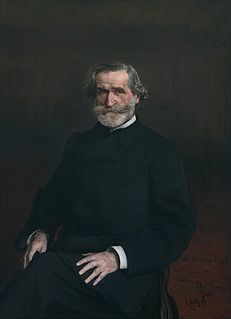
Giuseppe Fortunino Francesco Verdi was an Italian opera composer. He was born near Busseto to a provincial family of moderate means, and developed a musical education with the help of a local patron. Verdi came to dominate the Italian opera scene after the era of Vincenzo Bellini, Gaetano Donizetti, and Gioachino Rossini, whose works significantly influenced him. By his 30s, he had become one of the pre-eminent opera composers in history.

Opera is a form of theatre in which music has a leading role and the parts are taken by singers, but is distinct from musical theater. Such a "work" is typically a collaboration between a composer and a librettist and incorporates a number of the performing arts, such as acting, scenery, costume, and sometimes dance or ballet. The performance is typically given in an opera house, accompanied by an orchestra or smaller musical ensemble, which since the early 19th century has been led by a conductor.

Domenico Gaetano Maria Donizetti was an Italian composer. Along with Gioachino Rossini and Vincenzo Bellini, Donizetti was a leading composer of the bel canto opera style during the first half of the nineteenth century. Donizetti's close association with the bel canto style was undoubtedly an influence on other composers such as Giuseppe Verdi.
A baritone is a type of classical male singing voice whose vocal range lies between the bass and the tenor voice types. Originally from the Greek βαρύτονος (barýtonos), meaning heavy sounding, music for this voice is typically written in the range from the second F below middle C to the F above middle C (i.e. F2–F4) in choral music, and from the second G below middle C to the G above middle C (G2 to G4) in operatic music, but can be extended at either end. The baritone voice type is generally divided into the baryton-Martin baritone (light baritone), lyric baritone, Kavalierbariton, Verdi baritone, dramatic baritone, baryton-noble baritone, and the bass-baritone.
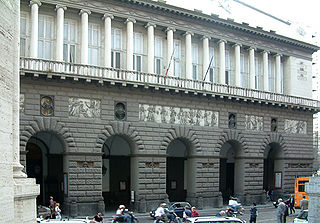
An opera house is a theatre building used for opera performances that consists of a stage, an orchestra pit, audience seating, and backstage facilities for costumes and set building.

Opera seria is an Italian musical term which refers to the noble and "serious" style of Italian opera that predominated in Europe from the 1710s to about 1770. The term itself was rarely used at the time and only attained common usage once opera seria was becoming unfashionable and beginning to be viewed as something of a historical genre. The popular rival to opera seria was opera buffa, the 'comic' opera that took its cue from the improvisatory commedia dell'arte.
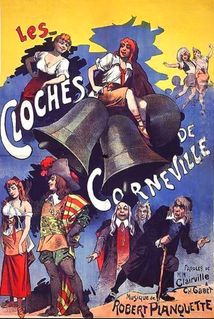
Comic opera is a sung dramatic work of a light or comic nature, usually with a happy ending and often including spoken dialogue.
Opéra comique is a genre of French opera that contains spoken dialogue and arias. It emerged from the popular opéras comiques en vaudevilles of the Fair Theatres of St Germain and St Laurent, which combined existing popular tunes with spoken sections. Associated with the Paris theatre of the same name, opéra comique is not always comic or light in nature; Carmen, perhaps the most famous opéra comique, is a tragedy.
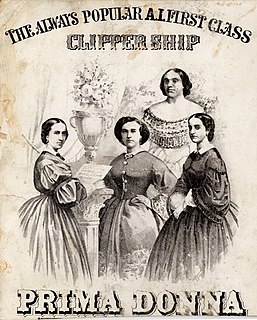
In opera or commedia dell'arte, a prima donna is the leading female singer in the company, the person to whom the prime roles would be given. The prima donna was normally, but not necessarily, a soprano. The corresponding term for the male lead is primo uomo.
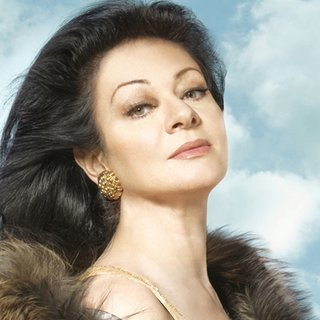
Daniela Dessì was an Italian operatic soprano, born in Genoa.

L'esule di Roma, ossia Il proscritto is a melodramma eroico, or heroic opera, in two acts by Gaetano Donizetti. Domenico Gilardoni wrote the Italian libretto after Luigi Marchionni's Il proscritto romano, in its turn based on Louis-Charles Caigniez and Debotière's Androclès ou Le lion reconnaissant. It premiered on 1 January 1828 at the Teatro San Carlo, Naples.

Giuseppe Taddei was an Italian lyric baritone, who, during his career, performed multiple opera composed by numerous composers.
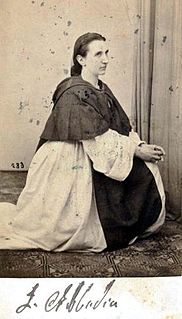
Luigia Abbadia (1821–1896) was an Italian operatic mezzo-soprano known for her fine voice, secure technique, and a strong temperament. Possessing an uncommonly wide range, Abbadia sang several roles traditionally portrayed by sopranos in addition to roles from the mezzo-soprano repertoire.
Roger Parker is an English musicologist and, since January 2007, has been Thurston Dart Professor of Music at King's College London. His work has centred on opera. Between 2006 and 2010, while Professor of Music at Gresham College, London, Parker presented four series of free public lectures, one example being "Verdi and Milan" in 2007 which is available on video.
Dramma per musica is a libretto. The term was used by dramatists in Italy and elsewhere between the late-17th and mid-19th centuries. In modern times the same meaning of drama for music was conveyed through the Italian Greek-rooted word melodramma. Dramma per musica never meant "drama through music", let alone music drama.
Fanny Corri-Paltoni was a celebrated British operatic soprano active in Europe between 1818 and 1835. It was said that she possessed a voice of remarkable beauty and that she had a fine singing technique. She particularly excelled in the operas of Wolfgang Amadeus Mozart and Gioachino Rossini.

An insertion aria is an aria sung in an opera for which it was not composed. It was a practice that began in the seventeenth century and continued actively through the late 19th century and sporadically through the 20th century. The insertion aria could replace an existing aria, or might be added to an opera. All insertions were planned in advance. They might be composed by the same composer of the opera, or might have been written by a different composer, with or without the knowledge of the opera's composer. Most insertions were of arias; infrequently non-operatic songs were inserted. Insertions could consist of arias, duets, ensembles, even entire scenes. Although men and women singers used insertion, women are the ones most remembered for the practice. The years 1800–1840 represent the apex of influence that women singers exerted over the operatic stage, influencing most aspects of opera performances, including insertions.
Jessica Pratt is an operatic soprano. Born in Bristol, England, she has lived in Australia since 1991 and is the daughter of a tenor. She began by studying the trumpet for ten years before concentrating her studies on singing.
Vincenzo Galli was an Italian opera singer and impresario. Considered an outstanding basso buffo singer, he created many roles on Italian stages, including ones in two of Donizetti's operas: Ivano in Otto mesi in due ore and Cesare Salzapariglia in Le convenienze ed inconvenienze teatrali. Luigi Ricci composed the role of Michelotto in his opera Chiara di Rosembergh specifically for Galli's voice.
















